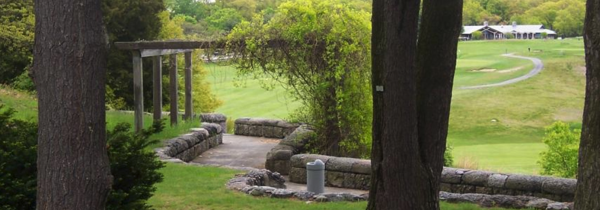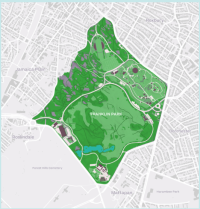December 13, 2023

A view of Franklin Park's Schoolmaster Hill, the one-time home of Ralph Waldo Emerson. Franklin Park Coalition photo

On Dec 13, 2022 – one year ago this week – City of Boston officials gathered at the Franklin Park Overlook to launch the Franklin Park Action Plan. Between line dancing led by Boston Rhythm Riders and photo ops with community members, Mayor Michelle Wu spoke at length of the city’s commitment to the Action Plan and the key role it plays in addressing city priorities of environmental justice and climate resilience.
Designed by Frederick Law Olmsted in 1885, Franklin Park is the largest park in Boston and the “crown jewel” of the Emerald Necklace. Featuring woodlands and ball fields, winding paths and picnic groves, no park in Boston serves as large and diverse a set of populations and uses.
The Franklin Park Action Plan presents a generational vision for reinvestment in Franklin Park, one that knits together Olmsted’s original master plan with current uses and future needs. In addition to plans for long-term capital investments, the Action Plan recommends specific operational funding increases to support long-deferred park maintenance and ecological restoration. Last month, the plan won an Award of Excellence from the American Society of Landscape Architects, which recognized that it “rejuvenates the park while respecting and protecting its value to adjacent communities.”
Commissioned by the City of Boston, the Action Plan was developed through an extensive process of community engagement, with design expertise from a consortium of consulting firms. Hundreds of Boston residents voiced their views about the park at many community meetings organized in coordination with the Franklin Park Coalition, a community-based park advocacy organization, on whose board of directors we serve. About $1 million was spent on the plan.
We congratulate the city for this successful initiative. Now it is time to put the Action Plan into action, with dedicated funding in the FY2025 operational budget.
Despite all the fanfare of one year ago, the Action Plan has been eclipsed in recent months by plans to redevelop the Shattuck Hospital site and renovate White Stadium. These proposals have sparked important conversations, but they both propose how Franklin Park can be used for purposes other than general recreation, missing the critical value of the park itself to the surrounding neighborhoods and city at large.
Go to Franklin Park on a weekday morning and you will see hundreds of Bostonians out for their daily exercise, a walk with a friend, or a quiet moment with nature. On any given Sunday, you will encounter dozens of picnics and cookouts, cricket, softball, basketball and tennis games, birthday parties and yoga classes.
The park hosts major festivals including the Franklin Park Kite and Bike Festival, the Boston Art & Music Soul (BAMS) Festival, the Caribbean American Carnival, the Boston Athletic Association’s Half Marathon, and the city’s largest Juneteenth event. On Tuesday nights in July and August, hundreds gather for community concerts at the Elma Lewis Playhouse, reviving the tradition of the acclaimed Black arts educator’s park performances in the 1970s.
The Franklin Park Coalition was surprised that despite Mayor Wu’s strong endorsement of the Action Plan, the city’s FY2024 operations budget contained no new funding for implementation. The FY2025 budget, now in preparation, offers the opportunity to fund the operational needs outlined in the Action Plan, including additional maintenance staff, an ecological restoration crew, and a Franklin Park manager. Although the city set aside $28 million in capital funds from the sale of the Winthrop Square garage, new permanent staffing is needed to implement and maintain restoration projects and recover from deferred park maintenance. The Action Plan recommends close to $1.5 million in additional operations funding annually.
Parks are among our greatest public goods, alongside the library system, schools, mass transit, and community safety. Yet Boston spends less than a penny on parks for every dollar in the city operational budget. Advocates have called for a minimum of “1 percent for parks” to align Boston with other major metropolitan areas. If the city funded parks at this level, the additional $8 million each year would go a long way to addressing major deferred maintenance in Franklin Park and throughout the system.
If the city is serious about investing in Franklin Park, the Action Plan provides the roadmap. It’s time to move from plan to action.
The authors are residents of Hyde Park and Roxbury and serve on the board of directors of the Franklin Park Coalition. Rickie Thompson is board president.
Villages:
Topics:


